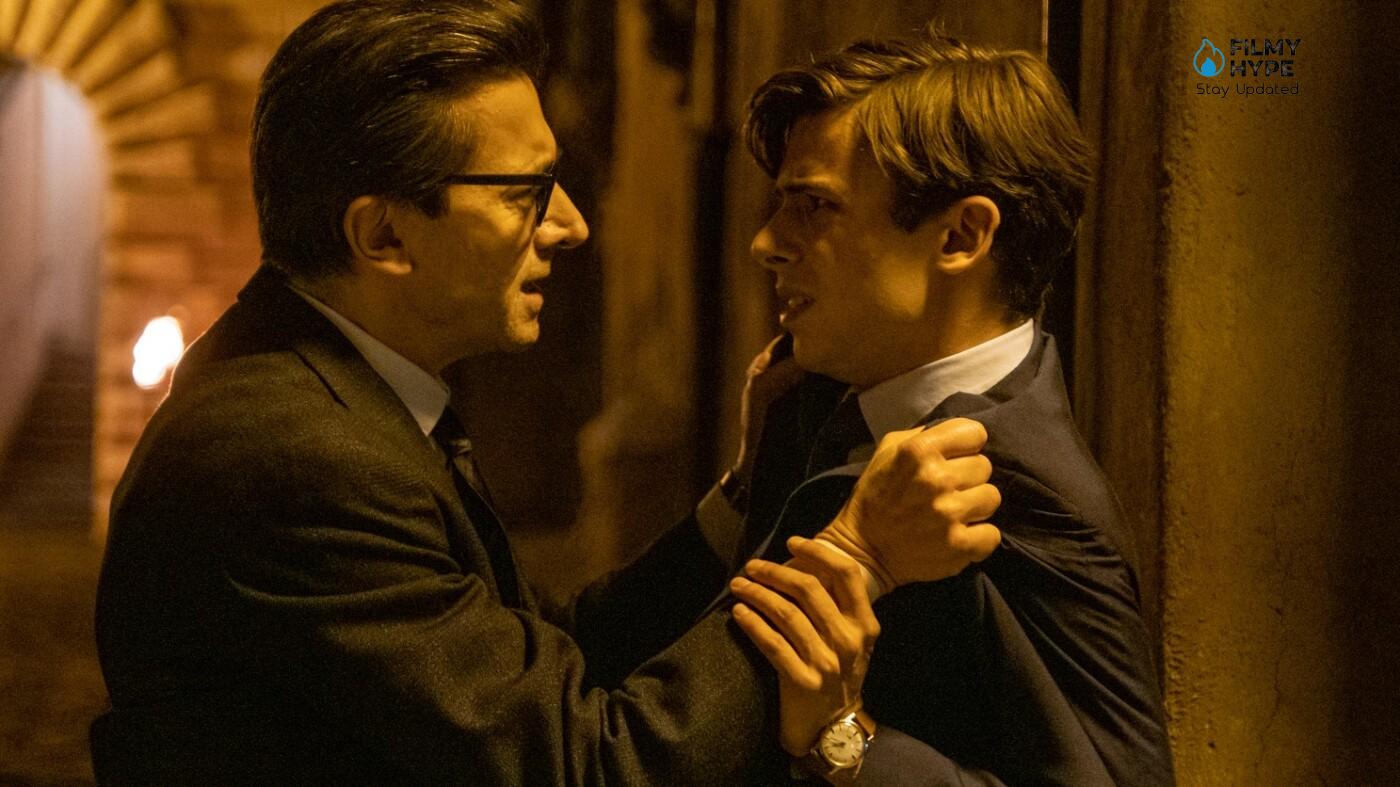The Lord of The Ants: The True Story Of Aldo Braibanti? The Biography Of The Emilian Intellectual
Who was Aldo Braibanti? We retrace the true story of the lord of the ants, in the cinema thanks to the direction of Gianni Amelio and the interpretation of Luigi Lo Cascio.
How can a scholar of myrmecology be called in Italy if not “The Lord Of The Ants”? But Aldo Braibanti, to whom this epithet fits perfectly, was much more and perhaps even calling him simply intellectual is not enough. Anti-fascist and partisan to the core, he dealt with literature, theater, poetry, literature, cinema, art and politics and, yes, also with myrmecology. It is a pity, however, that if you ask around – and not just the younger ones – who Aldo Braibanti is – few will be able to answer you promptly and just as many will remember the court case that placed him at the center of the Italian news.
The Lord of The Ants: The True Story Of Aldo Braibanti? The Biography Of The Emilian Intellectual
To refresh the memory, in an Italy that is increasingly facing (at least apparently) inclusion, is the director and screenwriter Gianni Amelio, which brings The Lord of the Ants to the big screen: a film that transcends the stylistic features of the biopic to be the spokesperson for a corporate malaise, to translate into a cry for justice and exasperation of love and beauty. It does so, as we also wrote in the review, by bringing to the attention of the viewer a story made of bigotry, madness, love and people who could be anyone, could be us. The actors, but not only, in turn, make this artistic ritual real and human and Amelio knows how to let truthfulness flow through the veins of Luigi Lo Cascio, Elio Germano, Sara Serraiocco, and Leonardo Matese.

Those who have seen the film, presented at the 79th Venice Film Festival and the cinema from 8 September 2022 with 01 Distribution, will have the desire to know more, to fully grasp that story told by fictionalizing and we, after all, we are here for this, to reconstruct the identity and past of Aldo Braibanti, starting from his biography which in the film, for obvious reasons, was truncated. The lord of the ants begins with an event that is in some ways dramatic and upsetting since it is the intention of the Calabrian director not to tell the entire life of the intellectual, but to focus on the Braibanti case and its absurdity.
Who Was Aldo Braibanti? The Biography Of The Emilian Intellectual
For the record, however, it is good to provide some information on the life and career of the Emilian intellectual, born in Fiorenzuola d’Arda on 17 September 1922, where he spent his childhood. Thanks to his father (a doctor by profession) he traveled the length and breadth of the province of Piacenza, he became passionate about the study of nature and in particular of social insects (ants, bees); at school, he goes crazy for Dante Alighieri, Francesco Petrarca, Ugo Foscolo, Giacomo Leopardi, Giosuè Carducci, Giovanni Pascoli, Gabriele D’Annunzio; he is interested in politics embracing the anti-fascist faith, thanks to an enlightened and anticlerical family.
In this regard, it is good to remember, to fully delineate Braibanti’s temperament, the time he secretly spread to school (he attended the Liceo Classico Romagnosi, in Parma, from 1937 to 1940) a manifesto in which he invited his comrades to go against the fascist dictatorship. A swagger that does not entail anything from a legal point of view due to good school conduct. But Aldo does not surrender to any intimidation: in 1940 he joins the liberal-socialist political movement Justice and freedom and later (in ’43) to the Communist Party.
In 1947, however, he decided to break away from political life, devoting himself exclusively to culture. He had moved to Florence after high school to study Philosophy, expanding his mind towards new authors and gradually approaching a more scientific study of myrmecology. His cultural interest, however, did not run aground at the study, also exploding into real productions, actually surfaced already in his youth and then undoubtedly perfected. In the field of poetry he professes freedom, breaking rhythmic patterns and also engaging in theatrical scripts.

His art, which in the film is whispered from the mouth of a Luigi Lo Cascio who falls with all the weight he has in his body in the part of Braibanti; but it is also screamed, recited in scenic triangles that give us one of the cultural realities most dear to the author, that is the artistic laboratory of Castell’Arquato: a cultural space conceived by Braibanti in 1947 at the Farnese tower of Castell’Arquato (small town of the province of Piacenza), in which he gives life to a varied artistic production, embracing poetry, theater, making ceramics and attracting to himself, in addition to composers Renzo and Sylvano Bussotti, also Carmelo Bene (actor, director, playwright, philosopher, writer and poet) and the Bellocchio brothers.
In the film The Lord of the Ants, we notice how in this environment there is a proliferation of attention, culturally precious situations and how it is, after all, a starting point for the gossip of the country, for those minds so dull as to demonize the work of the intellectual, blaming him to the point of exhaustion. Following the non-renewal of the rental contract, this space will close its doors, diverting Aldo Braibanti to Rome, where he moved in 1962. Here he dedicated himself to the theater, founded the magazine Quaderni Piacentini together with the brothers Giorgio and Marco Bellocchio, to the making of a film together with Alberto Grifi (Transfert per kamera towards Virulentia), holds an exhibition of assemblages together with Giampaolo Berto. In this same Rome that is teeming with freedom and novelty, however, Aldo Braibanti is accused of plagiarism and condemned.
Aldo Braibanti and The Love Story With Giovanni Sanfratello
The name that breaks through the heart of the nonconformist intellectual is that of Giovanni Sanfratello (who in the film takes on the physiognomy of Leonardo Maltese and changes his name to Ettore), a young twenty-year-old who, from what the film itself tells us, was fascinated by the culture of Braibanti, from his way of doing and thinking. After having met at the artistic laboratory of the Farnese tower and following the closure of the latter, they flee together from that provincial village to go and live where no one knows or can judge them, with the young man who leaves his family behind, taking them distances.
The motivation of Giovanni Sanfratello’s departure from his loved ones is easily understood also from what you see on the big screen: tremendously Catholic and traditionalist people, backward, convinced that they can cure everything with prayers, obsessed with the idea that evil hides in sexual orientation or political ideology. Limited to the point of locking up the son in a psychiatric clinic and accusing Aldo Braibanti of the crime of plagiarism.
The Lord of The Ants: The Truth Behind Ettore/Giovanni Sanfratello’s Imprisonment: In An Asylum Only Because He Is Homosexual
How exactly did things go? The film begins, as is well known, with the incursion of Ettore’s family to the house where the two lovers stay we do not know exactly the details of how it happened, but the transposition of Gianni Amelio is enough to provoke us disgust, to annoy us.
According to what was reported by various sources, Giovanni Sanfratello was kidnapped by four men (including his brother), who broke into the Roman pension where the boy was with Braibanti, loading him into the car (in which his father Ippolito was staying. Sanfratello) and transferring him first to a private clinic for nervous diseases, in Modena, and then to the asylum in Verona where, according to Alberto Moravia, the young man will suffer “A large number of electroshocks and various insulin shocks”.
The Crime Of Plagiarism: Explanation Of Article 603 And The Words Of The Director Of The Unit
The accusation of plagiarism against Aldo Braibanti by Ippolito Sanfratello, Giovanni’s father, arrived on 12 October 1964. It was, specifically, article 603 of the criminal code, which punished, with a prison term of 5 to 15 years, anyone who subjected a person to their power to reduce them to a total state of awe. A crime used merely to target those who had an ideology or a sexual orientation that did not conform to the masses, as in the case of Braibanti. A futile sentence, based almost on nothing and played with cunning and malice by that feignedly respectable class.

In this regard, we report the words of the director of the Unit Maurizio Ferrara, who in an article dated 13 July 1968 writes: “[…] It is the common opinion of jurists that this is a crime either non-existent or commonly practiced by anyone (man or woman) who has such a strong ideological personality as to induce others to become his apostle and follower. […] paradoxically, if a crime of ‘plagiarism’ exists, what should be called the activity of those who dedicate themselves to converting the so-called infidels or indifferent ones, even managing to make them abandon their homeland, work, and family to transform themselves into monks, let’s say o cloistered nuns! Either the crime of ‘plagiarism’ does not exist or every day, in Italy, thousands of authorized ‘plagiarists’ attempt the path of ‘reduction to a total state of subjection’ of boys, girls and adults, threatened with eternal punishments, mythological hell, if they don’t behave as the parish priest says”.
Still in the same article in the newspaper founded by Antonio Gramsci, the director of the time leans into examples from the past, finally defining the trial against Braibanti as “aberrant, a revival of the themes of the Inquisition, a raucous lawyer of a racist type against the third sex”.
Moving away from the opinions of the journalist and returning to speak specifically of article 603 of the criminal code (which reads: ” Anyone who subjects a person to his power, to reduce him to a total state of subjection, is punished with imprisonment from five to fifteen years”), it is good to know that it no longer exists since it was declared illegitimate by the Constitutional Court with sentence 96/1981. It had been inserted, in 1930, by the Minister of Justice of the Mussolini government, Alfredo Rocco.
The Braibanti Case: The True Story Behind The Lord Of The Ants
It is easy to understand that the accusation against the Emilian intellectual was going to damage his personality, so much so that Ippolito Sanfratello accused him of having influenced his son and having imposed on him his visions and principles. A big turn of words (and laws) aimed solely at condemning a homosexual relationship and with it any form of diversity.
The young Giovanni was interned in a psychiatric clinic for 15 months, subjected to terrible electroshock that should, as was believed at the time, “cure” him of a non-existent disease. After his discharge from the clinic, a series of clauses were imposed on him (which cause a bitter smile to listen to them), from the prohibition to read books that were less than a hundred years old to the obligation to stay with his parent’s house.
A useless “cure” that will ruin forever Giovanni Sanfratello, represented on the big screen completely wasted and battered, but lucid and convinced that there was nothing wrong in the relationship between him and Braibanti: no culprit because there is no guilt! Yet, during the trial and before the boy’s statements, the prosecutor went so far as to say that “the young Sanfratello was sick, and his illness had a name: Aldo Braibanti, gentlemen of the Court. When he appears, everything is dark”.
But if Sanfratello’s declarations had no weight whatsoever to favor the condemnation of the intellectual were the words of Piercarlo Toscani, an electrician with whom Braibanti had had an affair in the summer of 1960 (at the time the boy was nineteen years old). Toscani accused the intellectual of having indoctrinated him politically, introducing ideas of atheism and communism into his mind and preventing him from reading certain manuals to manipulate him intellectually. From there some newspapers of the time came up with a string of epithets with which to indicate the accused, defined as “the professor”, “the monster”, “the homosexual”.
Titles that in some ways are also shown in the film thanks to the presence of the journalist Ennio Scribani, played by Elio Germano. A fictional character who takes the side of the intellectual, narrating the facts as they are (and yes, basically what is reported above and extracted from L’Unità is quite in line with his thinking). The trial ended after four years, in 1968, with the sentence of Aldo Braibanti to nine years of imprisonment, which was reduced to six years and finally to four (the intellectual benefited from a two-year discount thanks to his activity in the Resistance).
During his imprisonment, he continued to devote himself to writing poetry and plays (including L’altra wound, a modern proposal by Sophocles’ Philoctetes, and the collection of essays The State Prisons).
A Social Process
If it is true that many rejoiced at his sentence, just as many said with Braibanti and among them various intellectuals of the caliber of Alberto Moravia, Umberto Eco, Elsa Morante, Pier Paolo Pasolini, and Carmelo Bene. It was clear to most that Braibanti was nothing more than the “scapegoat” of a society facing change, against the backdrop of the riots of ’68, of new political and corporate ideologies aimed at shattering traditions and old patterns. Who better than him, a communist and homosexual, could have fully embodied the Christ to be crucified, accused and sacrificed for all the evil of that small, ancient and obtuse world? His was the only sentence, in the postwar period, which appealed to the crime of plagiarism, which was then definitively abolished (as mentioned above).
You may wonder, what happened to Giovanni Sanfratello? Unfortunately, all traces of him have been lost, we only know that he passed away in 2018, sucked into oblivion in which, on the other hand, Aldo Braibanti himself risked ending up (in some ways). His name, at least until now, was not so well known to most people, but it is clear that his works and the connection with other intellectuals have made sure not to erase the traces of his existence. His artistic production is consistent, from poems to films to newspaper articles and plays, Braibanti never stopped being a well-rounded intellectual.
He continued to live in the capital for a long time, only to be evicted in 2005 from the house in Via del Portico di Ottavia (in the Ghetto area), where he had lived for forty years thanks to the minimum social pension he received. Following the intervention of the senator Tiziana Valpiana and, above all of the Constituent Teresa Mattei (with whom he had shared the period of imprisonment during the fascism), as well as thanks to the support of Franca Rame, a pro-Braibanti Committee was set up, thanks to which the intellectual was entitled to a life annuity (granted on 23 November 2006 by the second Prodi government, based on the Bacchelli law). He spent the last years of his life in his native land, in Castell’Arquato, in severe economic hardship, and then died on April 6, 2014, at the age of 91.
We conclude the story of his life by sharing one of his thoughts on homosexuality, the same one that sentenced him in court, perhaps the same that now makes us re-evaluate him and that led a flood of young people to take sides, in those eventful 60s, on the side of freedom.
“I will never be a homosexual militant, but I don’t like to judge. But I think that gay movements and others of this type are very important, they have the function of preparing many people who would otherwise be unable to enter militancy, to feel equal to those who believe they are already equal and can fight for the revolution”.





